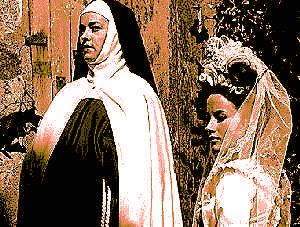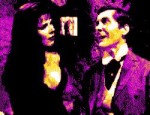Film Review
After pursuing a long and successful career as a cinematographer, lending
his talents to such highly esteemed works as Julien Duvivier's
Un carnet de bal (1937)
and Claude Autant-Lara's
Douce (1943),
Philippe Agostini began directing his own films in the 1950s, with limited
success. His feature debut
Le Naïf aux quarante
enfants (1958) isn't much to write home about and the less said about
his lame thriller
Rencontres
(1962) the better, but between these he made a film which has stood the test
of time and deserves to be more widely known than it presently is -
Le Dialogue
des carmélites. Agostini scripted and directed the film
in collaboration with Raymond Léopold Bruckberger, a Dominican priest
who had previously had some input into Robert Bresson's similar convent-based
drama
Les Anges du péché,
on which, incidentally, Agostini had been the cinematographer.
Le Dialogue des carmélites is taken from a 1948 stage play
of the same title written by Georges Bernanos, which was itself adapted from
a well-known novel of 1931, Gertrud von Le Fort's
La Dernière à
l'échafaud. Bernanos died shortly after completing his play,
which was first staged in 1952 by Marcelle Tassencourt, and the next year
was turned into an opera by Francis Poulenc. Bernanos's original dialogue
is mostly retained in Agostini's film, which, as a result, feels more than
vaguely redolent of a Robert Bresson film of this era, particularly as it
deals with the theme that is central to Bresson's oeuvre: the ambiguous nature
of faith. Unlike Bresson, Agostini opts for a more conventional style
of film, with a cast comprising some of the best-known French actors of the
time - Pierre Brasseur, Jeanne Moreau, Madeleine Renaud, Alida Valli and
Georges Wilson. There is even a cameo appearance from Jean-Louis Barrault,
replaying his legendary mime act from Marcel Carné's
Les Enfants du paradis
(1945), with a black comic twist.
Despite its starry cast and needlessly showy production values,
Le Dialogue
des carmélites more than does justice to Georges Bernanos's play
and provides a thoughtful and emotionally involving reflection on the power
and limits of faith. The stark juxtaposition of the French Revolution
in its bloodiest phase and the serenity of life in a Carmelite convent brings
into stark relief the noblest and most terrible aspects of human nature,
and the film continues to have an extraordinary resonance, even in a world
as faithless and directionless as the one we now appear to inhabit.
The final sequence depicting the Carmelites' brutal martyrdom, the grimmest
emblem of Robespierre's reign of terror, is one that cannot fail to stir
the emotions. The torment etched on Jeanne Moreau's face expresses
everything that we feel - horror for the crime mingled with exultation in
the ultimate victory of the spirit over human frailty.
© James Travers, Willems Henri 2016
The above content is owned by frenchfilms.org and must not be copied.
Film Synopsis
May, 1789. In Compiègne, a town in northern France, two young
women enter a Carmelite convent, each determined to devote their lives to
the service of Christ. Whilst one of the two - Sister Constance - is
fully prepared for the austere life that lies ahead, the other - Sister Blanche
- is afflicted with doubts and suffers from a morbid fear of death.
When the aged prioress dies, Mother Mary takes her place and agrees to honour
her dying wish to watch over the vulnerable Blanche. With the arrival
of the French Revolution the whole country is thrown into turmoil.
By offering a temporary refuge to Blanche's aristocrat brother the Carmelites
place themselves in grave danger and are soon suspected by the authorities
of harbouring anti-republican feelings. After taking mass with a priest
who is on the run from the revolutionaries, the sisters are forced to separate
and leave their convent. When then they defy these orders most of them
are arrested and condemned to death. As she watches her sisters being
led to the scaffold, Blanche finally finds the courage to join them...
© James Travers
The above content is owned by frenchfilms.org and must not be copied.


